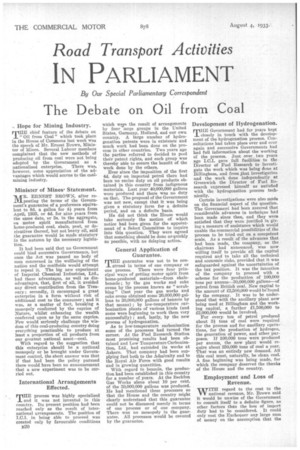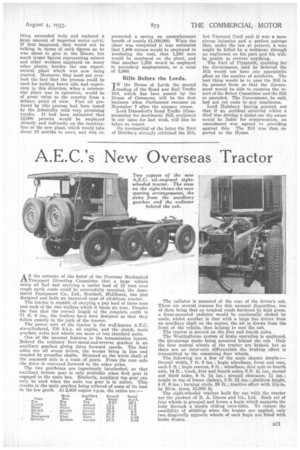Road Transport Activities
Page 30

Page 31

If you've noticed an error in this article please click here to report it so we can fix it.
IN PARLIAMENT
By Our Special Parliamentary Correspondent
The Debate on Oil from Coal
Hope for Mining Industry.
MHE chief feature of the debate on "Oil from Coal" which took place in the House of Commons last week was the speech of Mr. Ernest Brown, Minister of Mines. Several Labour members complained that the new methods of producing oil from coal were not being adopted by the Government as a nationalized enterprise. There was, however, some appreciation of the advantages which would accrue to the coalmining industry.
Minister of Mines, Statement.
/tint ERNEST BROWN, after reIN1peating the terms of the Government's guarantee of a preference equivalent to 8d. a gallon for 4i years from April, 1935, or 4d. for nine years from the same date, or 3s. in the aggregate, on motor spirit manufactured from home-produced coal, shale, peat, or derivatives thereof, but not heavy oil, said the guarantee would be made statutory in the autumn by the necessary legislation.
It had been said that no Government could bind successive Governments, but once the Act was passed no body of men concerned in the wellbeing of the nation and the coalfields would attempt to repeal it. The big new experiment of Imperial Chemical Industries, Ltd., had these advantages, as well as disadvantages, that, first of all, it avoided any direct contribution from the Treasury; secondly, it encouraged a great enterprise in a form without risk of additional cost to the consumer ; and it was, as a matter of fact, breaking a monopoly conferred by the caprice of Nature, whilst enhancing the wealth conferred upon us by the same caprice. Few would seriously challenge the wisdom of this coal-producing country doing everything practicable to produce at least a proportion of oil products from our greatest national asset—coal.
With regard to the suggestion that this enterprise should be a national monopoly or be brought under Government control, the short answer was that if that had been the policy pursued there would have been no announcement that a new experiment was to be carried out.
International Arrangements Effected.
T"process was highly specialized and it was not invented in this country. Its present position had been reached only as the result of international arrangements. The position of I.C.I. in being able to proceed was created only by favourable conditions
which we the result of arrangements by four large groups in the United States, Germany, Holland, and our own country. A large number of hydrogenation patents were in existence and much work had been done on the process in other countries. Two years ago the parties referred to decided to pool their patent rights, and each group was thereby able to secure the benefit of the work done by the others.
Ever since the imposition of the first 4d. duty on imported petrol there had been no excise duty on oil products obtained in this country from indigenous materials. Last year 40,000,000 gallons were produced and there was no duty on that. The proposal of the Government was not new, except that it was being given a statutory form for a definite period, and on a definite basis.
He did not think the House would take seriously the motion of which notice had been given for the appointment of a Select Committee to inquire into this question. They were agreed that something should be done as quickly as possible, with no delaying action.
General Application of Guarantee.
THE guarantee was not to be construed in terms of one company or one process. There were four principal ways of getting motor spirit from home-produced materials—from shalebenzoIe ; by the gas works and coke ovens by the process known as " scrubbing " (last year the gas works and coke ovens obtained some 26,000,000 gallons to 30,000,000 gallons of benzole by that means) ; by low-temperature carbonization plants of various kinds (and some were beginning to work them very successfully) ; and, lastly, by the new process of hydrogenation.
As to low-temperature carbonization some of the processes had turned the corner. At the Fuel Research Station most promising results had been obtained and Low Temperature Carbonisation, Ltd., had extended its works at Askern. That company had been supplying fuel both to the Admiralty and to the Royal Air Force with good results and in growing quantities.
With regard to benzole, the production had been established in this country for a number of years. At the Beckfon Gas Works alone about 10 per cent, of the 30,000,000 gallons was produced. He had mentioned these processes so that the House and the country might clearly understand that this guarantee could not be discussed merely in terms of one process or of one company. There was no monopoly in the guarantee. All processes would be covered by the guarantee.
Development of Hydrogenation.
THE Government had for years kept closely in touch with the development of the hydrogenation process. Consultations had taken place over and over again and successive Governments had had full information about the working of the process. Just over two years ago I.C.I. gave full facilities to the Director of Fuel Research to investigate the work which was being done at Billingham, and from jhat investigation and the work done independently at Greenwich the Director of Fuel Research expressed himself as satisfied with the hydrogenation process technically.
Certain investigations were also made on the financial aspect of the question. The Government had been assured that considerable advances in technique had been made since then, and they were satisfied that they were justified in giving a measure of assistance which would enable the commercial possibilities of the process to be tried out on a competent scale. As a result of the advances that had been made, the company, as the chairman had announced, was now willing itself to provide all the capital required and to take all the technical and economic risks, provided that it was safeguarded against the uncertainties of the tax position. It was the intention of the company to proceed with a scheme for the production of 100,000 tons per annum-30,000,000 gallons—of petrol from British coal. New capital to the amount of £2,500,000 would bifound by the company. It was to be understood that with the ancillary plant now being used at Billingham and the working capital, a further £1,500,000 to £2,000,000 would be involved.
For every, ton of petrol produced about 34 tons of coal were required for the process and for ancillary operations, for the production of hydrogen. the generation of power, and other purposes. If 100,000 tons were produced per annum, the new plant would require about 350,000 tons of coal a year. That was an entirely new demand. All this coal must, naturally, be clean coal. A fine beginning was being made, for which the company deserved the thanks of the House and the country.
Employment and Loss of Revenue.
WITH regard to the cost to the national revenue, Mr. Brown said it would be unwise of the Government to commit itself to a definite figure, as other factors than the loss of import duty had to be considered. It could only cost the Exchequer any large sum of money on the assumption that the
thing succeeded fully and replaced a large amount of imported motor spirit. If that happened, they would not be talking in terms of such figures as he was about to give to the House, but much larger figures representing miners and other workers employed on many other plants, besides the one experimental plant which was now being started. Moreover, they must not overlook the fact that the process could be used for making heavy oils, and experience in this direction, when a commercial plant was in operation, would be of great value to the country from a defence point of view. Fuel oil produced by this process had been tested by the Admiralty with very promising results. It had been estimated that 12,000 persons would be employed directly and indirectly on the construction of the new plant, which would take about 18 months to erect, and this re presented a saving on unemployment benefit of nearly £1,000,000. When the plant was completed it was estimated that 1,400 miners would be employed in producing the coal, that 1,280 men would be employed on the plant, and that another 1,280 would be employed in secondary employments, or a total of 3,960.
Bills Before the Lords.
TN the House of Lords the second -1-reading of the Road and Rail Traffic Bill, which has been passed by the House of Commons, will be the first business when Parliament resumes on November 7 after the summer recess.
Lord Danesfort's Road Traffic (Compensation for Accidents) Bill, explained in our issue for last week, will also be taken on report.
On recommittal of the latter the Earl of Halsbury strongly criticized the Bill, but Viscount Cecil said it was a monstrous injustice and a perfect outrage that, under the law at present, a man might be killed by a motorcar through no negligence on his part and his wife be unable to recover anything.
The Earl of Plymouth, speaking for the Government, said he believed the Bill would not have any appreciable effect on the number of accidents. The hest thing would be to pass the Bill in its present form so that the Government would he able to examine the report of the Select Committee and the Bill as amended. The Government, he said, had not yet conie to any conclusion.
Lord Halsbury having pointed out that if an accident occurred whilst a thief was driving a stolen car the owner would be liable for compensation, an amendment was agreed to providing against this. The Bill was then reported to the House.




















































































